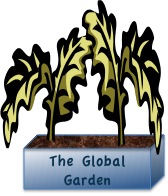My day began with pondering on how I would make the world a better place today. As I considered World Peace and energy reform, it was suggested that I work on the "starving millions" today. Got it. January 6, 2011: Starving millions.
I spend much of my time working on ways to help the overweight millions so the starving millions presents an interesting contrast. According to the WHO, there will be 2.3 billion overweight people across the world in 2015. The World Hunger Organization reports there were 925 million hungry people in 2010. Astounding, isn't it?
Is there one way to solve both problems? It is complex, I grant you. The overweight vs. hungry is a confusing mix of economics, war, poverty, policy, lack of education, culture and geography. Would it even be possible to come up with one simple way everyone could understand and implement?
In keeping with my focus on working with nature and yesterday's reflection on Grandpa, I have an answer: The Global Garden. The Global Garden is a way to teach people all across the world to grow one vegetable, each season, all year long. Now I need some really clever designer-people to come up with a cheap to manufacture, easily shipped, light, sturdy gardening container. And, I need some farmers to come up with a food crop per season that would grow in said container in all parts of the world (kale and zucchini top my list). And, I need some smart people to figure out organic soil distribution. All do-able! Can we say crowd-sourcing? Who's in?
Yes, okay, back to the point. The point is we have a world full of people who are suffering. The overweight and the hungry both have an issue with food. I am not suggesting growing one vegetable in each season will be the magic wand to solve both issues. The food yield from one vegetable crop each season isn't enough to feed the hungry and it isn't enough to keep the overweight from eating too much processed food. And, there are plenty of people who exist in a place where poverty, war and policy would make implementation very difficult.
It is a step however. Learning how food grows and thrives, tending the plant and reaping the reward of eating something you grew is pretty powerful. Getting people back in touch with soil and cycle of life is something most of us have long forgot. It isn't so crazy to think we could make this happen, is it?


No comments:
Post a Comment